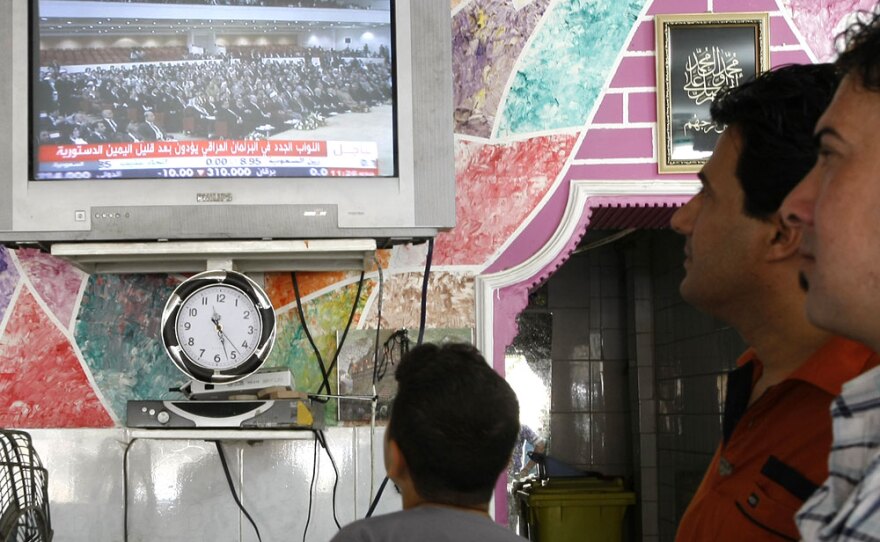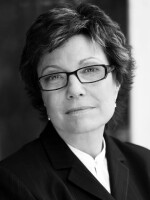Understanding Iraqi media is easy. They are like Fox News; they give away their political leanings immediately. Just reading their election headlines looks like reading campaign spin of various coalitions. -- Iraqi blogger Arabia Deserta, 2010
After surviving an American occupation, a sectarian civil war, and an election that has not yet produced a government, Iraqis have adopted a new survival skill: watching television.
Television has become essential to reaching Iraqi audiences. More than half the population, nearly 16 million viewers, turns to TV for information, more than any other medium, including newspapers, radio or the Internet.
Iraqis watch television at home, while smoking hubbly-bubbly in Baghdad cafes, while gazing up from plates of lamb and blackened tomatoes over lunch, and on small screens behind the grocery shop cashier.
Which channels are they watching? The choice is often an indication of sectarian identity.
The existing media weakens the Iraqi national identity or takes it in 100 directions.
The sectarian divide that drove the country to devastating violence from 2005 to 2007 has evolved into a political struggle, with satellite television ownership representing the power players.
There are Sunni TV, Shiite TV and Kurdish TV, with editorial policies that reflect the biases of each group. Even state television, modeled after the U.S. Public Broadcasting Service, has evolved into a news outlet that reflects the views of Prime Minister Nouri al-Maliki and is known in Iraq as "Maliki TV."
Other broadcasts are funded by ethnic political parties, political Islamists, Arab business interests and one multimillionaire, a former Baathist who ran the state broadcasting system for Saddam Hussein.
"The majority of Iraqi media today follows one political party or the other depending on who funds them," explains Iraqi journalist Hiwa Osman.
In a sectarian media landscape there is opportunity to self-select media that confirm ethno-sectarian identities. However, new media studies conducted in 2010 show the majority of Iraqi viewers have learned to "read" the media landscape.
Mohamad Abdel Dayem, at the Committee to Protect Journalists, explains why Iraqis turn to alternative news outlets despite obvious sectarian biases.
"You may or may not be pro-government. You don't want to be hoodwinked," Dayem said. "You still want to get decent news. And you don't want to get your news from the one source that is criticized as being most closely aligned to the government."
A 2010 study conducted by the International Research and Exchanges Board, a Washington, D.C.-based nonprofit organization, reports that many Iraqis watch more than five channels daily, which means they are sampling multiple opinions across the sectarian divide.
It is a survival skill, explains Osman, who described the transformation from the Saddam era to the new Iraq: "We've moved from one newspaper and one radio to 1,500 outlets. If you land today in Baghdad, you need to watch five or six television news bulletins to get the full picture."
At the same time, Iraqis are deeply skeptical of the information presented. As the IREX study found, "Iraqis have trust issues with TV media." While Al-Sharqiya TV has more viewers than any other domestic or international outlet, fewer than one-third of Iraqis polled trust the channel. The state-run news broadcasts on Al-Iraqiya score even lower, with only 21 percent saying they trust the government channel.
As Iraq's sectarian divide is increasingly fought in the media, the owners appear to be more disconnected from the national interests of the country.
"The existing media weakens the Iraqi national identity or takes it in 100 directions," says Osman. "The younger generation is looking for a national identity. They are asking, what is it that binds us all together? It won't come from the existing media."
This report is part of a longer study produced for the Joan Shorenstein Center on Press, Policy and Public Policy at Harvard's Kennedy School of Government.
Copyright 2022 NPR. To see more, visit https://www.npr.org. 9(MDAzMjM2NDYzMDEyMzc1Njk5NjAxNzY3OQ001))







